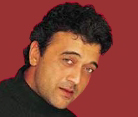 |
Interview
5

He's no longer the dreamy-eyed wanderer, searching for
answers to love and life. Aks, singer Lucky Ali's latest album, has
him looking back and looking ahead. Lucky Ali is octaves and
registers above the stereotypical pop star. He is not young, cool or
hip, neither does he sport amazing biceps or abs. He does not jump
around in the semi-nude with female dancers and back-ups and yell. Not
quite blending in with the current pop star mould, Lucky Ali is
mature, thoughtful and a complete no-nonsense music maker. His
intense stage chemistry with band members, and his immersion into
every note, every beat and nuance reveal his complete commitment and
honesty to the process of music making. Subtext screams out aloud -
"Look I'm here to
make music, I'm not here to be a star, or to share personal
trivia."
We meet
Maqsood Mehmood Ali, who we are more familiar with as Lucky Ali, on
one of his rare visits to India. He walks in, light on his feet,
sprinkling the air with sparkling "Hi, Hi, Hi!" in a hungry
press meet in Mumbai city. The son of veteran comedian Mehmood, New
Zealand-based Lucky is chatty and friendly. His eyes are the
lightest shade of brown, hazel, if you may, and his frank open
countenance exudes a bright cheerfulness. We set down to examine the
particular forces that have given his latest album Aks (which means
'reflection') the uplifting exuberant feel that it has. "Happiness, sheer
happiness," confesses Lucky, smiling broadly. He nods.
"A lot of
travelling, a lot of happiness, I really enjoyed doing this
album." So where is that dreamy eyed wanderer with
stubble, who roamed the deserts in search of love? "That was my first
album," states Lucky. Then he was young, and truly
searching, hunting for answers to love and life. Aks has Lucky right
there bang in the center, as he explains, "Looking back and looking
ahead."
He's obviously been through the rough ride,
which his very first album Sunoh showcased, Sifar consolidated, and
now what he has left is only "very positive expressions. I wrote
the album without an iota of negativity." Missing the
slight twist of pathos that spikes his sound, and reluctant to burst
into celebration, one questions whether pain is not essential for
creativity?
"Sensitivity to pain is important," points out the
singer/song-writer. "But when you are in pain, you can feel only pain.
However, you have to have the ability to be sensitive to hurt, in
order to be creative."
With the phenomenal success of tracks like Kyon Chalti Hai Pawan and
Ek Pal Ka Jeena from the flick Kaho Na Pyaar Hai, Lucky Ali's hit
the Bollywood playback singing arena. Now identified as the voice of
Hrithik Roshan, can one look forward to him singing for several
other blockbusters? "Not as far as I foresee," he says. "I did Kaho Na Pyaar Hai more out of family
attachments than anything else."
Aks, without a doubt, is the best work that Lucky Ali has offered
yet. It maps the evolution of the singer, reflects a depth and
maturity that perhaps his debut album lacked, though it sure
revolutionised the Indi-pop scene at the time, selling more than
4,00,000 copies. As on Sunoh and Sifar, in Aks
as well, there are interesting and exotic sounds from the west and
east, with prominent acoustic guitaring, typically the Lucky Ali
signature sound. The two singles on Aks - Tere Mere
Saath and Kitni Haseen Zindagi - are so catchy, that you
might need Lucky Ali's fourth album to knock these out of your
head!
|
 |










